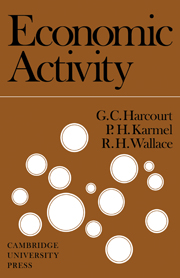Book contents
- Frontmatter
- Preface
- Contents
- 1 INTRODUCTION
- 2 THE NATIONAL ACCOUNTS AND THE INCOME–CREATION PROCESS
- 3 THE PRODUCTION–INCOME–EXPENDITURE CIRCUIT AND NATIONAL ACCOUNTING IDENTITIES
- 4 THE DETERMINATION OF THE EQUILIBRIUM LEVEL OF REAL INCOME
- 5 THE CONCEPT OF FULL EMPLOYMENT
- 6 MONEY IN THE ECONOMIC PROCESS
- 7 THE BANKING SYSTEM AND THE QUANTITY OF MONEY
- 8 THE CONSUMPTION FUNCTION
- 9 THE DETERMINANTS OF INVESTMENT EXPENDITURE
- 10 THE EFFECT OF CHANGES IN EXPENDITURE PLANS: THE MULTIPLIER CONCEPT
- 11 THE GOVERNMENT SECTOR AND THE DETERMINATION OF REAL INCOME
- 12 THE OPEN ECONOMY
- 13 THE INTERACTION BETWEEN PLANNED EXPENDITURES AND FINANCIAL FACTORS
- 14 INFLATION
- 15 ECONOMIC POLICY
- List of suggested reading
- Index
15 - ECONOMIC POLICY
Published online by Cambridge University Press: 18 December 2009
- Frontmatter
- Preface
- Contents
- 1 INTRODUCTION
- 2 THE NATIONAL ACCOUNTS AND THE INCOME–CREATION PROCESS
- 3 THE PRODUCTION–INCOME–EXPENDITURE CIRCUIT AND NATIONAL ACCOUNTING IDENTITIES
- 4 THE DETERMINATION OF THE EQUILIBRIUM LEVEL OF REAL INCOME
- 5 THE CONCEPT OF FULL EMPLOYMENT
- 6 MONEY IN THE ECONOMIC PROCESS
- 7 THE BANKING SYSTEM AND THE QUANTITY OF MONEY
- 8 THE CONSUMPTION FUNCTION
- 9 THE DETERMINANTS OF INVESTMENT EXPENDITURE
- 10 THE EFFECT OF CHANGES IN EXPENDITURE PLANS: THE MULTIPLIER CONCEPT
- 11 THE GOVERNMENT SECTOR AND THE DETERMINATION OF REAL INCOME
- 12 THE OPEN ECONOMY
- 13 THE INTERACTION BETWEEN PLANNED EXPENDITURES AND FINANCIAL FACTORS
- 14 INFLATION
- 15 ECONOMIC POLICY
- List of suggested reading
- Index
Summary
Introduction
The discussion in previous chapters has been directed mainly towards the provision of tools for the analysis of how the economy works; in particular, how the level of economic activity is determined. This, in itself, is a proper subject for study and research. However, an understanding of the economy enables one to go beyond pure analysis and description to a consideration of the ways in which man can control his economic environment. If the manner in which the economy works is known, perhaps the economy can be made to operate in a manner closer to that desired by the community. For some people, the study of economics is an end in itself; but for most, the important thing is increased knowledge which can be used for the purpose of manipulating the economy to contrive particular results. This chapter is concerned with economic policy in the full economy.
It should be stressed that economic policy is only one aspect of government policy, although a very important one. Most government policies have economic aspects, but in many the main objectives are other than purely economic ones, for example, defence, foreign affairs and social welfare. The balancing of objectives is the essence of politics: wealth may have to be sacrificed to defence; economic growth to social equality. The weighting or priority of the various objectives, some of which may conflict, is a political matter, about which the economist qua economist has no more expertise than any other man in the street.
- Type
- Chapter
- Information
- Economic Activity , pp. 298 - 317Publisher: Cambridge University PressPrint publication year: 1967



